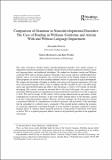| dc.contributor.author | Perovic, Alexandra | |
| dc.contributor.author | Modyanova, Nadezhda N. | |
| dc.contributor.author | Wexler, Kenneth | |
| dc.contributor.author | Perovic, Aleksandra | |
| dc.date.accessioned | 2015-04-09T19:30:02Z | |
| dc.date.available | 2015-04-09T19:30:02Z | |
| dc.date.issued | 2013-04 | |
| dc.date.submitted | 2012-04 | |
| dc.identifier.issn | 1048-9223 | |
| dc.identifier.issn | 1532-7817 | |
| dc.identifier.uri | http://hdl.handle.net/1721.1/96511 | |
| dc.description.abstract | This study investigates whether distinct neurodevelopmental disorders show distinct patterns of impairments in particular grammatical abilities and the relation of those grammatical patterns to general language delays and intellectual disabilities. We studied two disorders (autism and Williams syndrome [WS]) and two distinct properties (Principle A that governs reflexives and Principle B that, together with its associated pragmatic rule, governs pronouns) of the binding module of grammar. These properties are known to have markedly different courses of acquisition in typical development. We compare the knowledge of binding in children with autism with language impairment (ALI) and those with normal language (ALN) to that of children with WS, matched on age to the ALN group, and on age and nonverbal mental age (MA) to the ALI group, as well as to two groups of typically developing (TD) controls, matched on nonverbal MA to ALI and ALN groups. Our results reveal a remarkably different pattern of comprehension of personal pronouns and reflexives in ALI as opposed to ALN, WS, and two groups of TD controls. All five groups demonstrated an equal delay in their comprehension of personal pronouns, in line with widely reported delays in TD literature, argued to be due to delayed pragmatic abilities. However, and most strikingly, the ALI group also showed a pronounced difficulty in comprehension of reflexive pronouns, and particularly of the knowledge that the antecedent of a reflexive must c-command it. The revealed pattern confirms the existence of a particular impairment concerning Principle A in this module of grammar, unrelated to general language delays or cognitive deficits generally present in a large portion of individuals with autism as well as WS, or to general pragmatic deficits, known to be particularly prevalent in the population with autism. | en_US |
| dc.language.iso | en_US | |
| dc.publisher | Taylor & Francis | en_US |
| dc.relation.isversionof | http://dx.doi.org/10.1080/10489223.2013.766742 | en_US |
| dc.rights | Creative Commons Attribution | en_US |
| dc.rights.uri | http://creativecommons.org/licenses/by/3.0/ | en_US |
| dc.source | Taylor & Francis | en_US |
| dc.title | Comparison of Grammar in Neurodevelopmental Disorders: The Case of Binding in Williams Syndrome and Autism With and Without Language Impairment | en_US |
| dc.type | Article | en_US |
| dc.identifier.citation | Perovic, Alexandra, Nadya Modyanova, and Ken Wexler. “Comparison of Grammar in Neurodevelopmental Disorders: The Case of Binding in Williams Syndrome and Autism With and Without Language Impairment.” Language Acquisition 20, no. 2 (April 2013): 133–154. | en_US |
| dc.contributor.department | Massachusetts Institute of Technology. Department of Brain and Cognitive Sciences | en_US |
| dc.contributor.mitauthor | Modyanova, Nadezhda N. | en_US |
| dc.contributor.mitauthor | Wexler, Kenneth | en_US |
| dc.contributor.mitauthor | Perovic, Aleksandra | en_US |
| dc.relation.journal | Language Acquisition | en_US |
| dc.eprint.version | Final published version | en_US |
| dc.type.uri | http://purl.org/eprint/type/JournalArticle | en_US |
| eprint.status | http://purl.org/eprint/status/PeerReviewed | en_US |
| dspace.orderedauthors | Perovic, Alexandra; Modyanova, Nadya; Wexler, Ken | en_US |
| dc.identifier.orcid | https://orcid.org/0000-0002-4282-7650 | |
| dc.identifier.orcid | https://orcid.org/0000-0001-5246-0277 | |
| dc.identifier.orcid | https://orcid.org/0000-0001-6290-1160 | |
| mit.license | PUBLISHER_CC | en_US |
| mit.metadata.status | Complete | |
